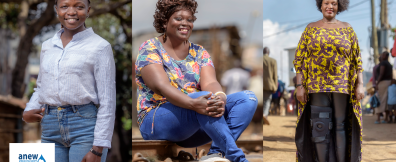Nancy Barasa: ‘many girls feel unsafe when collecting water’
‘Many girls from Kibera, a Kenyan slum, feel unsafe when collecting water’, shares Nancy Barasa (21 years).
Interview: November 2021
Warning this article contains content on (sexual) violence

Nancy tells about harassment for girls while collecting water
'To take an example, they’re sexually harassed. Boys strike their buttocks as they’re lifting one of their 20-litre jerrycans. Some girls even feel compelled to have sex in exchange for water.’
Nancy is also regularly sexually harassed. ‘When I fetch water, boys are often hanging around the waterpoint. They stare at me; offer to carry a jerrycan. But if you say “no,” they become angry and start attacking you verbally. Their comments make you feel worthless and ugly.’
The tap only opens for ‘acquaintances’
According to Nancy, many of the guys who operate the waterpoints and collect money abuse their position of power. ‘For instance, they’ll only open the tap for girls they know or for girls who’ve already done them certain favours’, explains Nancy. ‘Because of this, you might stand in line for a whole day, but, at the end of the day, you still don't have any water. And then, it can be the same old song the very next day. Eventually, you start to think about becoming "friends" with guys like this at the waterpoints.’
Coming home without water, as Nancy points out, is simply not an option. ‘Your mother will immediately send you back out of the house to look for water somewhere else, even in the evening. This leaves us especially vulnerable. Girls end up engaging in extreme behaviour, like having sex for water.’
An offer to carry jerrycans
Fortunately, Nancy has never had sex for water. When she was 10, however, a situation nearly took a turn for the worst. ‘I went to get water and, at the waterpoint, a man of about 40 was loitering around. He offered to help me with my jerrycans, presented me with sweets and then suggested that I accompany him to his house’, recounts Nancy.
Thankfully, she had been taught at school about the dangers of the streets and to not accept help from strangers. ‘I ran home and told my father about the man. He marched straight back to the waterpoint with me and exploded at the man. Luckily, it never happened again after that.’
Initially, Nancy failed to register the seriousness of the situation. ‘The only reason I didn’t accept the man's request was due to what I’d learned at school. I didn’t understood the threat hanging over my head until I saw how my father lashed out at the man.’
Nancy is also aware of how lucky she is to have her father. In a lot of families in Kibera, the fathers are either alcoholics or are completely absent. ‘My father even helps us to fetch water and cook. I know how unique that is in Kenya.’
‘Your mother will immediately send you back out of the house to look for water somewhere else, even in the evening. This leaves us especially vulnerable.'
Sexual harassment at public toilets and showers
The unsafe conditions near toilets and showers is another big problem, remarks Nancy. Most of Kibera’s iron-corrugated houses are not equipped with a toilet or shower, forcing girls to use public pay-per-use toilets and showers.
Nancy reports that girls are regularly sexually harassed at these toilets by the boys collecting payment for the toilet and shower facilities. ‘When I go to the [public] toilets, the toilet attendant’s friends often ask for my number. If I refuse to give it, the toilet attendant will not let me use the facilities the next time. All while there are very few public toilets in Kibera.’
Nancy decided to try to change this situation and to work toward better access to water. ‘Access to water is a human right’, proclaims Nancy. ‘And water is especially important for girls. They need it for showering and cooking, but also to wash themselves while menstruating. Therefore, they should never be subjected to this kind of issue.’

'Thanks to this kind of training, it’s no longer taboo. What’s more, the girls I’ve trained can now begin educating other girls themselves'
No longer taboo
Nancy educates girls about their rights and explains how having sex for water is not just a bad idea, it’s also very risky. ‘You can even contract diseases like HIV from it.’ She also advocates on social media, such as Twitter and Facebook, for lawmakers to criminalise practices like sex for water and to improve access to water and to safe toilet and shower facilities.
As Nancy points out, ‘I’m very proud of having trained more than two thousand girls about the dangers and risks of sex for water. Before, this was a topic no one dared to talk about. But now, thanks to this kind of training, it’s no longer taboo. What’s more, the girls I’ve trained can now begin educating other girls themselves’.
**UPDATED FEBRUARY 2023, one year after the interview**
Nancy still lives in Kibera with her family and continues to work daily for the rights of women and girls. She recently started working as an assistant program officer at the Zamara Foundation in Nairobi: a feminist organization committed to bodily autonomy and integrity and intersectional feminist transformational leadership for young women.



